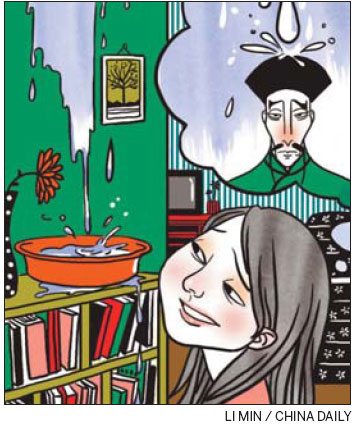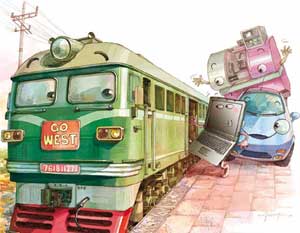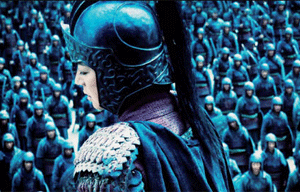Getting people to take responsibility is like a form of water torture
Updated: 2011-10-25 08:01
By Dinah Chong Watkins (China Daily)
|
|||||||||
Back in the 1950s, American kids would regularly race to their TVs to watch the latest Flash Gordon episode. In his golden, ornate chamber, the evil Fu Manchu would strap down his latest victim to a splintered wooden plank.
Lying there prone and unable to move a finger, the buxomly blonde would shriek with fear as the delighted villain gamely stroked his wispy goatee and then with a flourish, unscrewed the opening of the water vessel hanging above her head. The water slowly formed into a tiny ball until gravity took its course, the droplets falling "plink, plink, plink " on her forehead.
The victims were said to go insane at the never-ending irritation. This was ominously known as The Chinese Water Torture.
 |
Like death and taxes, there is guaranteed to be a few repairs needed when moving into a new home. Things that the former tenant didn't think was really necessary - like a working telephone line or a fully functioning water pipe. With zeal born of ignorance, I took to the repairs, unaware that another splintered, wooden plank was waiting with my name on it.
Much has been said of the current "victimhood" mentality of the United States. Maybe it started with the million dollar lawsuits and payouts for "emotional distress", maybe it was the continuing emasculation of women and the feminization of men, maybe because after the "Greatest Generation" (1910-1930) they raised a bunch of crybabies. Whatever, the backlash has produced a growing movement to take responsibility for one's own actions.
China on the other hand, has both culturally and institutionally sought out a "fall guy" whenever a situation arises. Along with steamed fish and rice, stir-fried scapegoat is a fond staple of the Chinese diet.
A leaking water pipe is a case in point. A dozen repairmen revolved through my home, like beauty pageant contestants only less useful.
Each of them took a look at my dripping walls and quickly declared it was the landlord's problem or the management's problem or the guy who lived upstairs, anyone's problem but theirs.
In a twist on the physician's creed of "Do no harm", Chinese culture has evolved into a bureaucratic guide that prescribes: "Do nothing and you can't be blamed". Recent reports of local hospitals leaving patients untreated due to the same fears, abound.
That this thinking has led to incidents involving good Samaritans who are punished and fined for helping those in need only goes to show that something must be done. But what? Blame is an entrenched part of our culture.
I grew up with blame, we threw it around like day-old spaghetti. In a Chinese family, being accountable when things go south has no upside. For Asians, failures are never forgotten and like clockwork, are rehashed, time and time again.
A bloom of mold on the wall greeted me the following day, brackish water slowly filling up the bucket underneath the leak. While there's nothing more dangerous than eating dirt-cheap "meat" buns from a Beijing street vendor, a determined tenant with a lot of time on her hands and Google can be a menace.
I tracked down my absentee landlord in a distant country and an earful of indignant whining soon produced another repairman who promptly knocked a hole in the wall, fixed his flashlight on the offending leak and happily told me not to worry - it was the apartment above me that was to blame.
Of course, he wouldn't fix it since it was someone else's problem.
My arm felt itchy. Was that a spot of mold on my skin? My hands felt bound. Swollen mold spores burst inside my body. The water wouldn't stop; plink, plink, plink on my forehead ...












